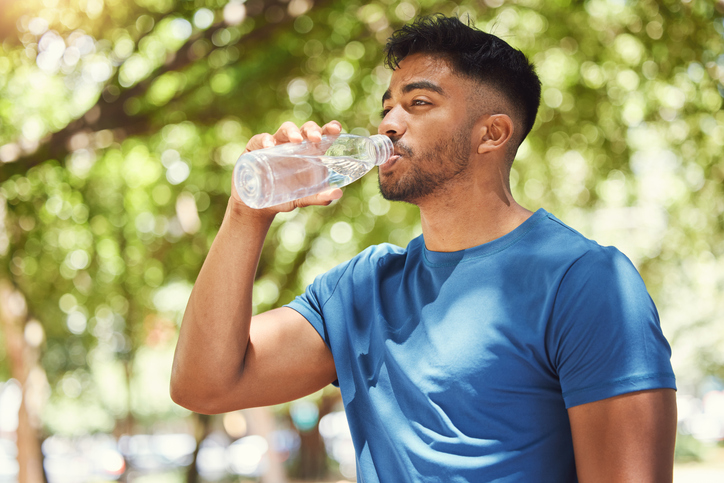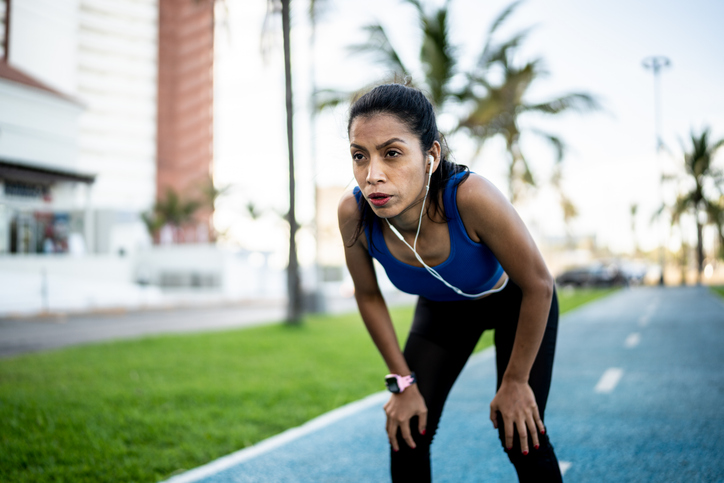How Dehydration Can Hurt Your Workout Results

When’s the last time you were reminded of the importance of proper hydration during exercise? Odds are fairly recently. In fact, it’s almost customary, after chugging a mouthful of sports drink, to offer a chirpy “stay hydrated!” to our fellow exercisers.
So we all know it’s good for us, but why? And even more importantly, did you know that proper hydration has a huge impact on athletic performance?
OK, so maybe it’s a stretch to say that nailing your workout takes priority over not dying of dehydration. But still, knowing that fluid replacement can dial up your workouts — and your results — is a powerful motivator, so let’s take a closer look.
Why Proper Hydration Matters for Your Health

We’re made up of about 50 percent or 60 percent water, so hydration plays all sorts of roles in our bodies.
It’s required for several reactions inside cells. It transports materials throughout the body. It acts as a solvent and a lubricant for organs and joints. It’s thermoregulatory. And, it’s crucial for keeping the cardiovascular system operating.
Furthermore, we have a bad habit of dying without water, usually in 7 to 10 days — even less if we exercise since the resulting perspiration means increased water loss.
Considering we take in water every day via the beverages and foods in our diet, forgetting to hydrate during your 60-minute workout probably isn’t a death sentence — but before you write off the fitness industry’s constant push for hydration as a ploy to sell sports drinks and fancy bottles, keep in mind that you might survive without focusing on proper performance hydration, you certainly won’t thrive.
The amount of water (and electrolytes) you have in your system directly impacts your physical and mental abilities on the playing field, road, track, plyo mat, or wherever else you hit it. Beachbody Performance Hydrate, a supplement specially formulated for all-out performance, boasts an optimal balance of carbohydrates and electrolytes that quickly replaces what’s lost, so you can stay hydrated when you’re exercising.
Why Proper Hydration Matters When You Work Out
The most obvious role water plays in exercise is to cool you down. The reason you perspire during exercise is the same reason an engine heats up when you drive a car. Generating energy creates heat.
When you work out, your metabolism increases to create more energy, raising your core body temperature. To help bring that temperature down, you perspire.
How much you sweat depends on your genes, exertion level, and external situation. Generally, people turn over between half a gallon to two gallons of water a day — much of which evaporates — but people in extreme heat situations or doing extreme exercise can lose up to five or six gallons.
What’s more, when you sweat, you lose electrolytes, which comes with its own batch of issues — the most obvious of which is cramping.
But water plays a bigger role than just cooling you down when you work out. It’s crucial to keeping your cardiovascular system running smoothly. When the water content in the body drops, so does blood volume.
This means the cardiovascular system delivers less blood to muscles; they get less oxygen and are slower to flush waste products.
They also get less blood sugar, which means they use up glycogen stores quicker (meaning you’ll bonk faster). And less blood volume also impairs your skin’s ability to sweat, so your core temperature rises.
All and all, this means your body has to work harder to achieve less.
Research Shows the Importance of Proper Hydration

There’s no shortage of research supporting this. A number of studies have shown dehydration diminishes muscle strength and power and inhibits high intensity endurance significantly, even when subjects lost as little as 1 percent of their weight in water.
In one study, fluid loss equaling 2 percent body weight appeared to reduce running performance by 5 percent at both 5,000m and 10,000m — that’s like losing well over a minute on your three-mile run time.
Another study showed that with 8 percent dehydration, participants walking to exhaustion lasted 55 minutes — as opposed to 121 minutes when hydrated.
Dehydration can also impact your brain, with research showing that losing 2 percent or more of your body weight in water negatively impacts hand-eye coordination, emotional state, and decision-making — none of which you want to happen when you’re dropping into a 10-foot wave or hammering a single track on your mountain bike at 30 miles per hour.
So next time the yahoo warming up next to you at the half marathon quips “Stay hydrated!” keep in mind this isn’t just canned advice to be filed next to “Don’t eat 30 minutes before you swim” and “Only cardio burns fat.”
He’s actually giving you rock-solid advice that will improve your health, your power, your endurance, and your thinking. He also might be giving you the secret weapon that’ll help you beat his sorry butt across the finish line.
